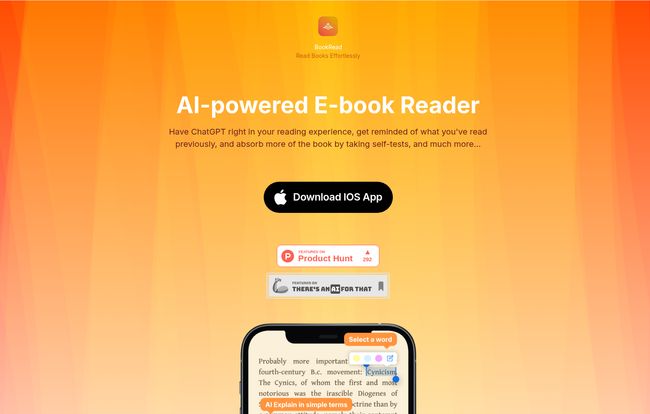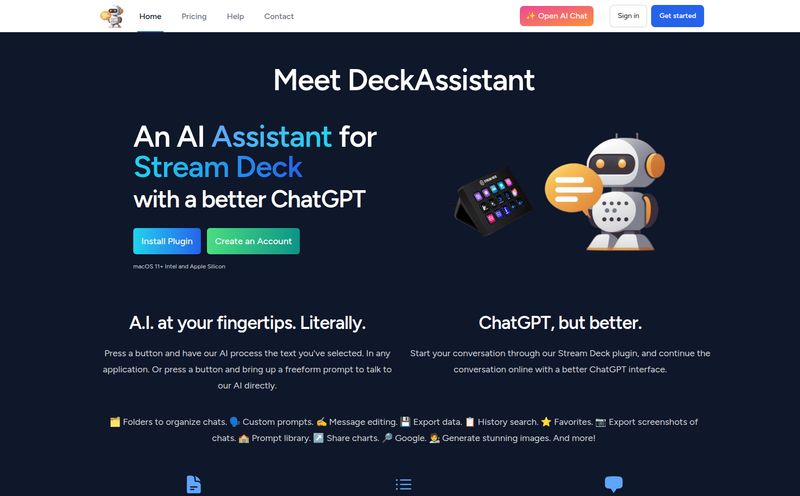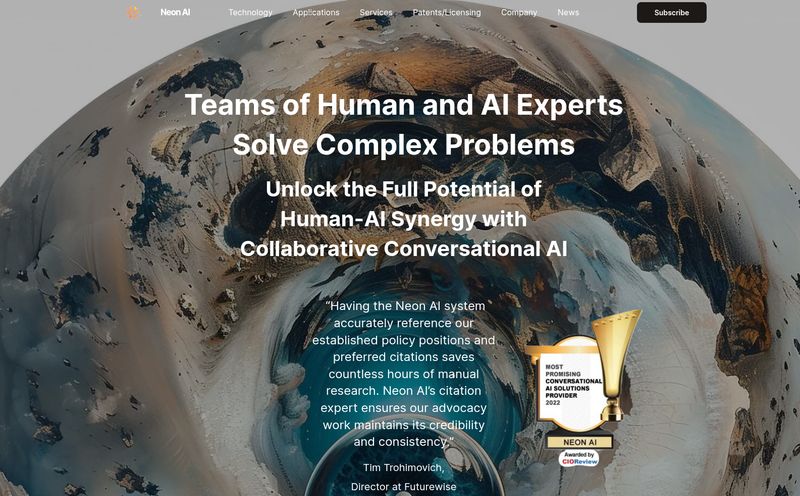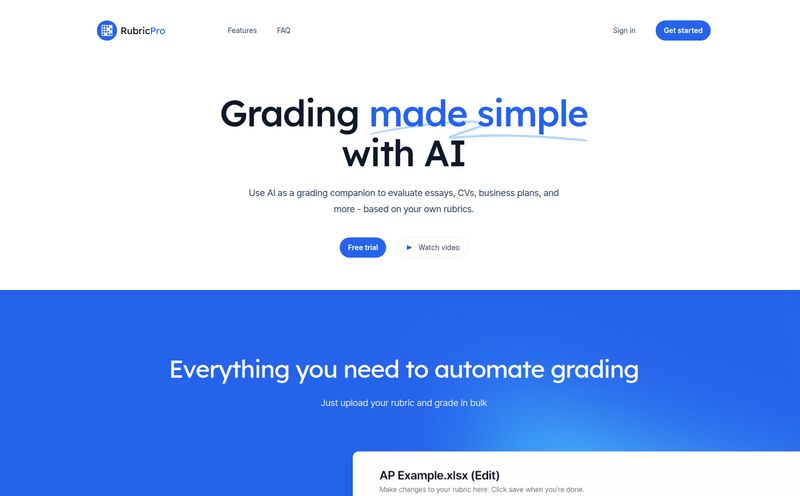We all have one. That digital pile of books we swear we'll get to. The one that stares back at us with silent, judging titles from our Kindle or Apple Books library. It's a graveyard of good intentions, fueled by one-click purchases and the romantic idea that this year we’ll finally read 50 books. The struggle is real.
But what if the problem isn't just starting a book, but staying with it? Or even worse, finishing a 400-page beast only to forget the key arguments two weeks later? I've been in the SEO and digital trends game for years, and I've seen countless apps promise to revolutionize our lives. Most of them are just noise. But every so often, something pops up that makes me lean in a little closer. Today, that something is called BookRead.
It's not just another e-reader. The pitch is that it's an AI-powered 'reading companion'. My internal skeptic immediately raised an eyebrow, but my inner book nerd who still can't quite summarize the middle chapters of Sapiens was intrigued. So, I took a look.
So, What Exactly is BookRead?
At its core, BookRead is an e-book reader app, but it's got a trick up its sleeve. It has ChatGPT baked right into the interface. Think about that for a second. You’re reading a dense historical text and come across a name you don’t recognize, or a turn of phrase that’s a bit... archaic. Instead of exiting the app, opening your browser, getting distracted by a notification, and forgetting what you were even looking for (just me?), you just highlight the text. Boom. Instant context.
The whole idea is to make reading smoother and, more importantly, to help you actually absorb what you're reading. It's built on the idea that reading shouldn't be a battle against confusion or forgetfulness. It’s a tool designed to tear down the barriers that make us give up on challenging books.

Visit BookRead
The Features That Made Me Look Twice
An app is only as good as its features, and BookRead has a few that genuinely stand out from the crowded marketplace of reading apps.
An AI Co-Pilot for Your Reading
The main event is obviously the AI Explanation feature. I like to think of it as having a friendly, pocket-sized librarian who's also a history professor and a linguist, all rolled into one. When you select a word or passage, it doesn't just give you a dry dictionary definition. It can pull from Wikipedia, explain historical context, and untangle complex ideas. Reading a classic novel and wondering about the political climate of the time? Highlight a name or event. Trying to get through a philosophy text where every sentence feels like a riddle? This could be your guide. It keeps you in the flow, in the world of the book, which is something I value immensely.
Finally, a Cure for 'Book Amnesia'
This one hit close to home. BookRead offers Reading Summaries that remind you what you've read before. How many times have you picked up a non-fiction book after a two-week hiatus and thought, “Wait, who was Adam Smith arguing with again?” This feature gives you a quick recap so you can dive right back in without rereading the last two chapters. It's a brilliant solution for people who, like me, tend to juggle multiple books at once or have to fit reading into small, chaotic pockets of time. It's a small thing, but it feels massive in its utility.
Active Learning, Not Just Passive Reading
This is where BookRead really shows its ambition. It's not content with you just reading the words; it wants you to retain them. At the end of chapters, it can generate flashcards and self-tests based on the content. It's like it turns your book into a personalized course. For students, researchers, or anyone reading for professional development, this is incredible. It transforms the passive act of letting your eyes slide over text into an active learning session. This approach is grounded in solid learning science—active recall is one of the most powerful ways to build long-term memory. Seeing it integrated so neatly into a reading app is pretty cool.
The User Experience: Clean, Simple, and... No Ads?
Okay, let's talk about the interface. From what I can see, it’s clean. It's minimalist. It looks like a space designed for reading, not for serving you pop-ups or notifications. And this brings me to a huge point: no ads. In a world where 'free' almost always means 'we're selling your attention to the highest bidder', a genuinely ad-free experience is a breath of fresh, clean, literary air. It shows a focus on the user's experience, which builds a lot of trust in my book (pun absolutely intended).
Let's Talk Brass Tacks: The Good and The Not-So-Good
No tool is perfect, and a good review has to be balanced. While BookRead gets a lot right, there are some definite caveats.
The advantages are clear: the AI explanations are a potential game-changer for difficult texts, the summaries and retention tools tackle a real pain point for readers, and the clean, ad-free UI is a joy. It feels like an app built by people who actually love to read.
However, there are a couple of elephants in the room. First, it's currently only available on iOS. That's a huge chunk of the market left out in the cold. While their website has a waitlist for an Android version, for now, if you're not in the Apple ecosystem, you're out of luck. Second, and this is more of a philosophical point, is the reliance on AI. I can already hear the purists. 'Doesn't this make you a lazy reader?!' It’s a fair question. Does offloading the 'hard work' of thinking to an AI diminish the reading experience? My take? It depends on how you use it. A calculator doesn't make you bad at math if you use it to speed up tedious calculations so you can focus on the higher-level problem. I see BookRead the same way. It's a tool to remove frustrating roadblocks, not a replacement for critical thinking.
The Mystery of BookRead's Pricing
So, how much does this futuristic reading companion cost? That's a great question. When I went to find their pricing page... I hit a 404 error. Page not found. This could mean a few things. The app might be so new that the page isn't live yet. It could be completely free while it's in an early phase to attract users. Or it might follow a freemium model down the line. For now, it appears to be free to download and use from the App Store. My advice? If you're an iOS user, grab it while it's free. That could very well change in the future.
My Final Verdict: Is BookRead Worth the Download?
So, what's the bottom line? I'm genuinely impressed with the concept of BookRead. It’s not just iterating on an existing idea; it's trying to solve some fundamental problems that readers, especially readers of dense non-fiction, have always faced. It's for the lifelong learner, the curious student, and anyone who wants to get more out of their reading time.
Is it for the person who just wants to blaze through the latest thriller on a beach? Maybe not. A standard Kindle app does that job just fine. But for anyone who sees reading as an act of learning and self-improvement, BookRead feels like a step in a very interesting direction. The iOS-only limitation is a real bummer, but I'll be first in line for the Android version. For iPhone and iPad users, this is one of the most interesting reading apps I've seen in a long time. It’s a definite 'try it and see' from me.
Frequently Asked Questions about BookRead
- What is BookRead?
- BookRead is an AI-powered e-reader app for iOS that integrates tools like ChatGPT to provide in-text explanations, summaries of previous chapters, and learning tools like flashcards and self-tests to improve reading comprehension and retention.
- Is BookRead available on Android?
- No, not at the moment. It is currently only available for iOS devices (iPhone and iPad). However, they have a waitlist on their website for users interested in an Android version.
- How much does BookRead cost?
- Currently, the app appears to be free. The pricing page on their official website is not active, suggesting it's either in a free beta/launch period or a pricing model has not been announced yet. It's available for free download on the Apple App Store.
- How does the AI in BookRead work?
- It uses technology similar to ChatGPT. When a user highlights a word, phrase, or passage, the AI provides context, definitions, and explanations without the user needing to leave the app.
- Can I import my own e-books into BookRead?
- Yes, as an e-reader, it's designed for you to import your own book files. While not explicitly stated, it likely supports common, non-DRM formats like EPUB, which is the standard for most e-books.
- Is BookRead better than a Kindle?
- They serve different primary purposes. The Kindle ecosystem is fantastic for buying and organizing a large library of books from Amazon. BookRead is less about the storefront and more about enhancing the process of reading a specific book, especially a complex one. You might use Kindle for casual reading and BookRead for more focused, study-oriented reading.
Conclusion
The way we read has been changing for centuries, from scrolls to codices to print to pixels. Tools like BookRead are simply the next chapter in that story. By smartly integrating AI, it’s not trying to replace the magic of reading but to augment it, making it more accessible, less intimidating, and ultimately more rewarding. In an age of information overload, a tool that helps you not just consume information but truly understand and retain it is a powerful thing. If you've got an iPhone, give it a shot. You might just find your new favorite way to read.
Reference and Sources
- BookRead Official Website: https://www.bookread.app/
- BookRead on Product Hunt: https://www.producthunt.com/products/bookread-2
- Wikipedia - Active Recall: https://en.wikipedia.org/wiki/Active_recall



